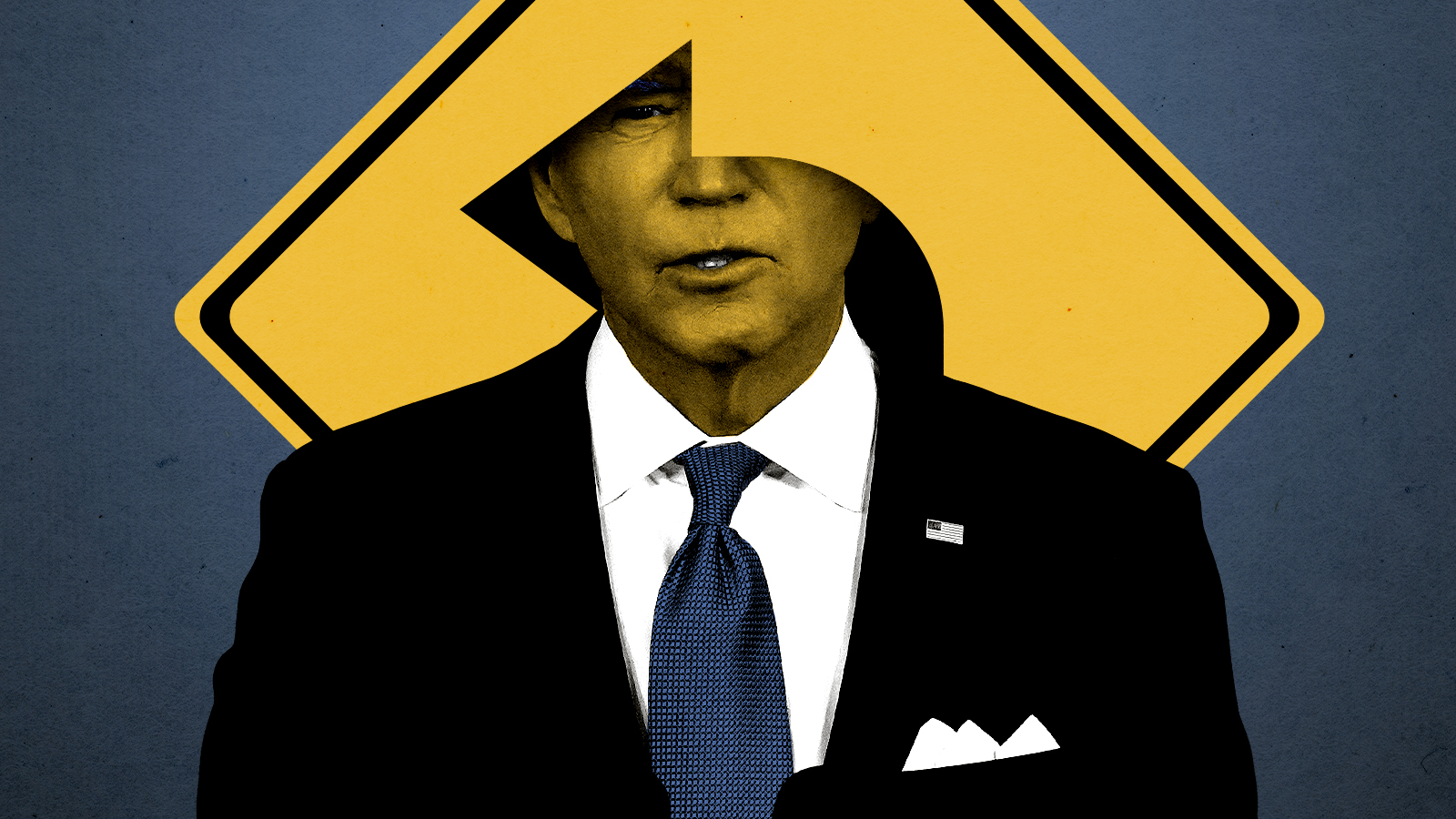How a left turn could save Joe Biden — and the country
Even as the crisis in Ukraine unfolds, the president needs to address issues that hit close to home


A free daily email with the biggest news stories of the day – and the best features from TheWeek.com
You are now subscribed
Your newsletter sign-up was successful
It's been a tough first year for Joe Biden.
During these 13 months, he's had to fight a historically lethal pandemic, manage the rocky pullout from Afghanistan, deal with soaring inflation, and face the torpedoing of both his Build Back Better agenda and voting rights legislation.
Biden has certainly lost his momentum in the domestic policy realm (some say he's lost his way). Clearly, the president needs a fresh start, a chance to relaunch his agenda before a national audience like the one offered by the upcoming State of the Union Address. The war in Ukraine will, of course, dominate Biden's attention, but urgent domestic issues will not disappear and must be addressed as well.
The Week
Escape your echo chamber. Get the facts behind the news, plus analysis from multiple perspectives.

Sign up for The Week's Free Newsletters
From our morning news briefing to a weekly Good News Newsletter, get the best of The Week delivered directly to your inbox.
From our morning news briefing to a weekly Good News Newsletter, get the best of The Week delivered directly to your inbox.
Americans need a pick-me-up to relieve their fatigue, discouragement, and grumpy mood. Some of this gloom obviously comes from the stress of pandemic living. More importantly, the public's sour feelings also reflect a budding recognition of the shocking structural weakness, corruption, and dysfunction that COVID has exposed at the heart of American life: the feckless, fragmented public health system's inability to manage a pandemic, particularly in minority communities; the nonexistence of long-term unemployment insurance and affordable, subsidized child care; public emergency profiteering by some of the biggest creators of long-term economic inequality, just to name a few.
A forceful restatement of Biden's 2021 agenda may lighten the public mood somewhat, but it won't dispel the public disgust provoked by these deeper, chronic failings.
If Biden and the leaders of his party want to build long-term governing majorities that can accomplish great things on behalf of ordinary citizens, they need to meet people where they're at. This means offering major national policy reform (supported by robust public messaging) that puts people first again, as the New Deal populists once did.
Some Democrats are certainly not on board with this, it must be said. After the shellacking the Dems received in last fall's state-level elections, party centrists predictably called for a tack rightward to shore up their political fortunes in terms that sounded much like what conservative pundit David Brooks prescribed recently: "Today is the day for Biden to begin revamping his presidency in a more centrist direction. There's no path forward for a leftish agenda."
A free daily email with the biggest news stories of the day – and the best features from TheWeek.com
Virginia Democratic Rep. Abigail Spanberger, echoing Brooks, said, "Nobody elected him to be FDR."
Oh, but I think they kind of did.
If Biden and his party are truly "out of touch" with the needs of ordinary Americans (62 percent of whom said so in an ABC News poll last November), why do other polls show that 62 percent of the voting public also supports Biden's Build Back Better plan? And why do solid majorities support individual elements of that plan such as clean energy and job investments (62 percent), housing affordability (61 percent), universal pre-K and childcare investments (both 55 percent), and an extension of the child tax credit (52 percent)?
Perhaps the Dems are more in touch than people think. This polling data on the president's agenda reflects a conviction most less-than-wealthy people of all parties, ages, and social classes have felt deep in their bones for decades now: America's economic and political systems don't work for them, and they're increasingly open to big reforms, maybe even New Deal-sized reforms, to fix them.
Why can't this reform agenda get through Congress, then? Well, Americans have been taught to distrust the one party that can deliver the goods, the Democrats. Large numbers of American voters — even, paradoxically, many of whom support elements of the party's agenda — characterize the Democratic Party as being "too far to the left."
It was not always so. Until the mid-1970s, the Democrats used to be the acknowledged guardians of the interests of the common person. That's when it openly ditched its commitment to populist New Deal priorities in favor of a new political worldview, neoliberalism.
As Washington Monthly editor Charles Peters explained in a public manifesto in 1982, neoliberals had measured the old liberalism and found it wanting. The new way of thinking repudiated doctrinaire leftwing thinking in favor of an open-minded and "pragmatic" yet still humane, idealistic liberalism. Neoliberalism promised to clean up government waste and inefficiency, strip government of its insular snobbery and elitism, and bring it in closer touch with regular people.
It also specifically rejected New Deal populism, its redistributionist public policy, and its enmity to the military and big business in favor of pro-business, free-market policy and economic growth. Growth, Peters claimed, "is most important now, because it is essential to almost everything else we want to achieve." In return, Peters promised (in strangely Reaganesque-sounding terms) that this new approach would lift all boats in a rising tide.
It didn't.
Slowly but surely over the next several decades, the promise of neoliberalism failed. While the New Deal sowed the seeds of a spectacular, postwar economy that endured through the 1970s, the subsequent neoliberal economy has made things difficult for almost everyone but the very rich.
In the process, the Democrats morphed into a center-right party that abandoned ordinary people in favor of the moneyed elites. To this day, by contrast, activists continue performing their yeoman's service, working to improve the lives of people in the economic wastelands of the South and the Rust Belt. The Democratic Party leadership, though, seems to care about the concerns and frustrations of ordinary people on an intermittent basis.
This has got to change.
If the Democrats want to accomplish great things, they will need to turn from neoliberalism and become Democrats once again by putting the needs of low- and middle-income citizens at the center of public policy. These new policy priorities will not and should not look exactly like those of the New Deal. After all, we could certainly learn something from what neoliberalism got right (concepts like public-private partnerships and calls for expanded citizen participation in government service). Still, to steal a neoliberal phrase, the solutions of the 1980s cannot solve the problems of the 2020s.
Under current political circumstances, Democrats will have to communicate this message in terms that voters long immersed in a conservative-dominant milieu are willing to hear. It will take time to successfully make the case for populist-friendly public policy, but it must be made.
This year's State of the Union address can be the first of a thousand steps if Joe Biden is willing to take it. With his working-class roots and superpower-level empathy, Joe from Scranton is uniquely qualified to deliver this message, if he wants to.
Now, the Ukraine crisis will, no doubt, dominate attention tonight (as it should), but bear this in mind: reorienting half a century of Democratic Party ideology is the work of months and years. All we need is for the party and its leader to take a step — a first step — and keep the pressure up until change finally comes.
Kevin Morrow is a freelance writer, copy editor, researcher, historian, and translator living in the Virginia suburbs of Washington, D.C. His writing has appeared in The New York Times's "Opinionator" blog, The Washington Times, the Washington Examiner, World War II, America in World War II, Civil War Times Illustrated, and on Medium.com. He is also the author and editor of Germany's Covert War in the Middle East: Espionage, Propaganda, and Diplomacy in World War I and is working on his second book, As a Combat Pilot at the Suez Canal, an annotated translation of a war memoir by Hans Henkelburg.
-
 Crisis in Cuba: a ‘golden opportunity’ for Washington?
Crisis in Cuba: a ‘golden opportunity’ for Washington?Talking Point The Trump administration is applying the pressure, and with Latin America swinging to the right, Havana is becoming more ‘politically isolated’
-
 5 thoroughly redacted cartoons about Pam Bondi protecting predators
5 thoroughly redacted cartoons about Pam Bondi protecting predatorsCartoons Artists take on the real victim, types of protection, and more
-
 Palestine Action and the trouble with defining terrorism
Palestine Action and the trouble with defining terrorismIn the Spotlight The issues with proscribing the group ‘became apparent as soon as the police began putting it into practice’
-
 The ‘mad king’: has Trump finally lost it?
The ‘mad king’: has Trump finally lost it?Talking Point Rambling speeches, wind turbine obsession, and an ‘unhinged’ letter to Norway’s prime minister have caused concern whether the rest of his term is ‘sustainable’
-
 The billionaires’ wealth tax: a catastrophe for California?
The billionaires’ wealth tax: a catastrophe for California?Talking Point Peter Thiel and Larry Page preparing to change state residency
-
 Bari Weiss’ ‘60 Minutes’ scandal is about more than one report
Bari Weiss’ ‘60 Minutes’ scandal is about more than one reportIN THE SPOTLIGHT By blocking an approved segment on a controversial prison holding US deportees in El Salvador, the editor-in-chief of CBS News has become the main story
-
 Memo signals Trump review of 233k refugees
Memo signals Trump review of 233k refugeesSpeed Read The memo also ordered all green card applications for the refugees to be halted
-
 Has Zohran Mamdani shown the Democrats how to win again?
Has Zohran Mamdani shown the Democrats how to win again?Today’s Big Question New York City mayoral election touted as victory for left-wing populists but moderate centrist wins elsewhere present more complex path for Democratic Party
-
 Millions turn out for anti-Trump ‘No Kings’ rallies
Millions turn out for anti-Trump ‘No Kings’ ralliesSpeed Read An estimated 7 million people participated, 2 million more than at the first ‘No Kings’ protest in June
-
 Democrats: Harris and Biden’s blame game
Democrats: Harris and Biden’s blame gameFeature Kamala Harris’ new memoir reveals frustrations over Biden’s reelection bid and her time as vice president
-
 ‘We must empower young athletes with the knowledge to stay safe’
‘We must empower young athletes with the knowledge to stay safe’Instant Opinion Opinion, comment and editorials of the day
